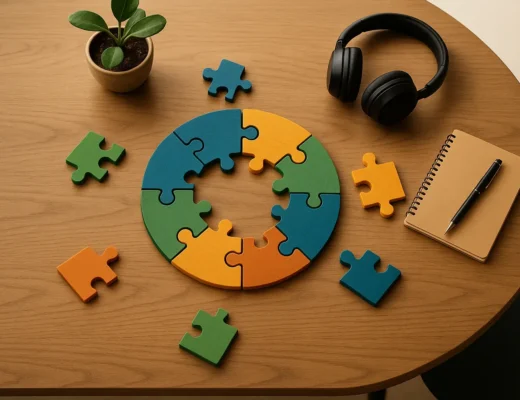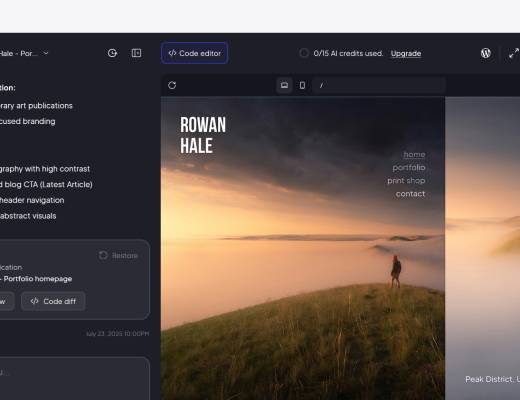18 Tips for Building a Culture of Kindness from Experts
We asked industry experts to share one thing their company does to promote a culture of respect and kindness among colleague — and how it’s reinforced. Learn about techniques that your organization can adopt to transform your work environment into one where appreciation, trust, and respect flourish naturally.
- Cross-Practice Mentorship Breaks Down Professional Silos
- Vulnerability Circles Remove Hierarchical Barriers
- Content-First Collaboration Amplifies Every Voice
- Assumption Audits Prevent Misunderstanding and Conflict
- Trust as Standard Creates Partner-Level Ownership
- Team Workshops Foster Open Communication
- Start Meetings with Moments of Appreciation
- Empathetic Leadership Transforms Personal Challenges
- Kindness as Formal Hiring Criterion Sustains Culture
- Project Presentations Showcase Individual Value
- Protecting Deep Work Hours Shows True Respect
- Open Appreciation and Trust Build Natural Recognition
- Psychological Safety Powers Meaningful Team Contributions
- Daily Practice Makes Respect an Expected Norm
- Real-Time Acknowledgment Creates Visible Appreciation Culture
- Handwritten Notes Recognize Everyday Kind Actions
- Role Model Recognition Program Honors Ethical Standards
- Open Creative Lines Welcome All Ideas
Cross-Practice Mentorship Breaks Down Professional Silos
I’ve learned that the legal profession can breed toxic competition between colleagues. We combat this through our “cross-practice mentorship” system where attorneys from different divisions — criminal, personal injury, family law — are paired up monthly.
For example, John Cruickshank from our employment division mentors our newer criminal attorneys, while I work with our family law team on trial strategies. This breaks down the usual silos where criminal lawyers only talk to criminal lawyers, creating genuine relationships across practice areas.
The reinforcement happens through our case review meetings where we celebrate wins collectively, not individually. When our personal injury team secured a major settlement last quarter, our criminal defense attorneys got the same recognition because they provided research support. Nobody’s protecting their billable hours or hoarding clients.
What surprised me most was how this reduced client complaints by about 30%. When lawyers respect each other internally, it shows in how they treat clients and opposing counsel. The respect becomes visible to everyone who works with us.

Vulnerability Circles Remove Hierarchical Barriers
We created what I call “vulnerability circles” where all staff — from therapists to cleaning crew — share their own recovery moments during weekly team meetings. Everyone on our team is in recovery themselves, so when our counselors talk about their day-one fears or our facilitators share recent challenges, it removes any hierarchy based on job titles.
This started after I noticed staff were hesitating to admit when they felt triggered by client situations or needed support themselves. Now our cleaning staff feels comfortable telling therapists when they overhear something that reminds them of their own struggles, and our therapists openly ask meeting facilitators for advice on specific recovery tools.
The reinforcement happens because everyone’s recovery story becomes part of how we serve clients better. When our receptionist shares how gratitude journaling helped her through a rough patch, that technique often gets incorporated into client sessions the same week. Nobody’s hiding their humanity — we’re all walking the same path at different stages.
Since doing this, we’ve eliminated the burnout that’s common in addiction treatment centers. Our staff retention is exceptional because people feel genuinely supported rather than expected to have all the answers just because they’re further along in recovery.

Content-First Collaboration Amplifies Every Voice
Respect and kindness are not viewed as “soft skills” or afterthoughts — they are baked into our operations. We learned that when you bring together people from different cultures, time zones, and backgrounds, the most important thing you can give is psychological safety.
One of the unique things we do is design every interaction as a team, whether in weekly standups or hiring interviews, around “content-first collaboration.” We do not waste time on status updates, ego-driven assertions, or idea validation. Our first premise is the contributions to ideas and outputs; next, the contributions themselves. This inverts the discussions from who speaks the loudest to amplifying someone’s contributions. Respect is built into the workflow.
In addition, we reinforce kindness in very tangible ways. For example, as part of our performance review framework, we measure how someone helps their colleagues grow, not simply their own individual KPIs. A small but important shift in what we measure reminds everyone that being smart is not enough — being generous matters too.
What I’ve found when you continually value and honor mutual respect and kindness at the structural level is that it ceases being a “culture initiative,” and it becomes invisible and just the way we work. And in education, that matters: we can’t ask families to trust us with their children if that is not the premise.

Assumption Audits Prevent Misunderstanding and Conflict
We implemented “assumption audits” during team meetings where colleagues explicitly question their interpretations before addressing conflicts or frustrations. This simple practice has transformed how people interact because it eliminates most interpersonal tension before it escalates into relationship damage.
The process works like this: when someone feels frustrated with a colleague’s behavior or decision, they’re encouraged to state their assumption out loud before reacting. For example, “I’m assuming Sarah didn’t include me in that email because she doesn’t value my input,” becomes a starting point for conversation rather than resentment building silently.
What surprised me was how often these assumptions were completely wrong. People would discover that Sarah was actually trying to reduce their workload, or was following up on a previous conversation they’d forgotten about. The simple act of verbalizing assumptions revealed how much workplace tension stems from misinterpretation rather than actual disrespect.
We reinforce this through monthly team retrospectives where people share examples of assumption audits that prevented conflicts or improved collaboration. Leaders model the behavior by publicly questioning their own assumptions about team decisions or client feedback. Most importantly, we celebrate instances where someone changed their perspective after an assumption audit, rather than treating it as admitting weakness.
The cultural shift has been remarkable. People approach disagreements with curiosity instead of defensiveness. They give colleagues the benefit of the doubt more readily because they’ve seen how often initial assumptions miss the mark. It’s created psychological safety where people feel comfortable being vulnerable about their interpretations and asking for clarification rather than making judgments.

Trust as Standard Creates Partner-Level Ownership
One of our simplest ways to instill respect is through making trust the standard. Too many remote teams get into purely transactional mode, so we flipped it and started treating our VAs as complete partners. That includes giving them ownership of results, bonuses for levels of performance, and respecting their calendar and family commitments. The payoff has been huge. Once a VA called in sick with a family crisis, and instead of second-guessing it, we simply instructed her to put family first. Without prompting, she caught up over the weekend. That sort of ownership grows when respect comes first.
We enforce it in practical ways. Managers train both VAs and customers on norms for plain-English communication, and we call out incidents of kindness and initiative during team calls. Making them public and rewarding them makes respect second nature and spreads it. The lesson is simple: kindness isn’t some kind of fluffy extra. Kindness creates loyalty, initiative, and a culture where people own the business as their own.

Team Workshops Foster Open Communication
Fostering a culture of respect and kindness is at the forefront of our organizational values. As the CEO and founder, I believe that a supportive environment not only enhances team dynamics but also directly translates to the quality of service we provide to our clients across the Greater Toronto Area, including communities like Maple and Newmarket.
One key initiative we have implemented is our monthly team-building workshops, which focus on open communication and collaboration. These workshops are designed to create a safe space for our technicians and office staff to share their thoughts, ideas, and even challenges they face in their roles. By encouraging honest dialogue, we reinforce the importance of listening to one another and valuing each team member’s perspective. This practice has cultivated a sense of camaraderie, where kindness and mutual respect become the norm rather than the exception.
In addition, we celebrate individual and team achievements regularly. Whether it’s successfully completing a challenging installation or receiving positive feedback from a customer, acknowledging these moments helps to build a supportive atmosphere. I often remind our team that every role contributes significantly to our mission of providing exceptional HVAC services, and we are all in this together.
Moreover, we have a formal mentorship program in place, where experienced technicians guide newer members of our team. This not only helps in skill development but also reinforces the values of empathy and respect, as mentors share their knowledge while fostering a welcoming environment for questions and learning.
We also prioritize work-life balance, understanding that our team members are not just employees but individuals with personal lives and commitments. By providing flexibility in scheduling, we show our respect for their time and well-being, which in turn enhances job satisfaction and loyalty.
In essence, our commitment to respect and kindness is intricately woven into the fabric of ALP Heating’s culture. By promoting open communication, celebrating achievements, facilitating mentorship, and recognizing the importance of work-life balance, we ensure that our team feels valued and supported. This, in turn, empowers them to deliver the top-notch service our customers have come to expect, making our community as comfortable as possible, no matter the weather.
As I always say, “A respectful workplace is a productive workplace.”

Start Meetings with Moments of Appreciation
One thing we do at my law firm to promote a culture of respect and kindness is to lead every team meeting with a moment of appreciation. Before diving into tasks or updates, we take a minute to recognize someone’s effort or highlight a small win from the week. It can be something as simple as how a paralegal helped a client feel more comfortable or how someone stepped in to assist with a tight deadline.
This small ritual has had a big impact. It shifts the energy in the room and reminds everyone that their work is seen and valued. It also sets the tone for how we speak to one another. When appreciation is part of the culture, kindness becomes the standard.
We reinforce this through daily interactions and by making respect a hiring priority. We do not just look for skills. We look for people who communicate with empathy and carry themselves with humility. If someone is not aligned with that, it becomes clear quickly.
Respect is not a policy. It is a habit. By practicing it in small consistent ways, we have created a work environment where people feel safe to speak up and supported in doing their best work.
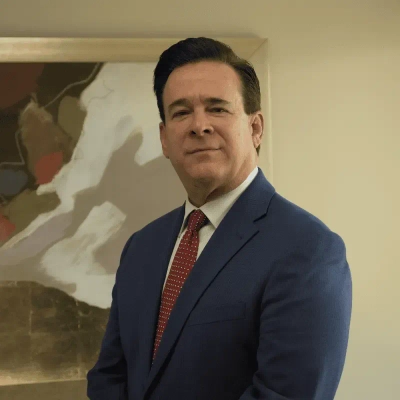
Empathetic Leadership Transforms Personal Challenges
At our company, we actively promote a culture of respect and kindness through our leadership approach that emphasizes empathy in all interactions. I’ve found that taking the time to understand what colleagues are experiencing both professionally and personally creates a foundation of trust across the organization. For example, I once noticed a top performer struggling and instead of focusing only on results, I initiated a conversation about their personal challenges, which completely transformed their performance afterward. We reinforce this culture by training all our managers to recognize when team members might be facing difficulties and to approach these situations with genuine concern rather than judgment. Our regular check-ins and open-door policy ensure that everyone feels comfortable sharing challenges they may be facing, which builds stronger relationships throughout the company.

Kindness as Formal Hiring Criterion Sustains Culture
We make kindness a formal hiring criterion, on par with technical proficiency. During interviews for remote developers, we move beyond assessing coding skills and ask specific behavioral questions about how they handle disagreements, give and receive critical feedback, and support teammates under pressure. We learned that in a distributed, cross-cultural environment, empathy and respect are essential for communication and prevent project-derailing friction. A brilliant developer who creates a toxic environment is a net loss.
This gets reinforced through the team itself. When you filter for respect at the door, the culture becomes self-policing. New hires enter a pre-existing environment where kindness is the default behavior, making it the standard they adapt to. Our formal policies are less about enforcement and more about simply codifying the behaviors our team members already demonstrate.

Project Presentations Showcase Individual Value
Respect and kindness were never left to chance; they were built into our teams. We trained, and when we met every month, the employee who leads the month’s team project would present their details, defeating a $15,000 pool system, or $60,000 in commercial installations. When I was first in the field, I vividly recall presenting about a pool system that I personally wired during my last summer in college, and it was the first ‘credit’ I received. My coworkers got to see the effort, and it changed their opinion of me. That same practice and connection continues to today and creates value in every decision throughout the entire workforce.
We support this by keeping historical results and tying them back to the individual. So if by design change we eliminate 20 hours of install time or $400 of material waste, we recognize the individual publicly at company meetings. Recognition in that fashion is not anecdotal; it is provable and based on success. They quickly learn their contribution is the group’s contribution, and it flows into kindness because the recognition is specific and meaningful. Respect develops when people see every role has impact in the success of the project, and when it is in place, the entire workforce elevates.
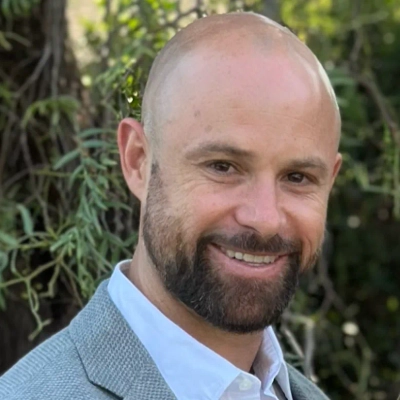
Protecting Deep Work Hours Shows True Respect
It’s easy to conflate respect with availability. Being the fastest to reply, the first to join a call, and the last to log off. We flipped that logic by protecting “deep work” hours: no pings, no meetings, no interruptions. The goal isn’t isolation; it’s respect for cognitive flow. When engineers are solving complex architecture challenges or aligning multi-cloud Salesforce integrations, uninterrupted focus is the purest form of kindness.
Microsoft’s 2023 Work Trend Index backs this up. Teams that defend focus time report 23% higher empathy and significantly lower stress. We’ve seen the same pattern: once people stop equating responsiveness with respect, collaboration actually improves. Colleagues return to shared work with clearer thinking and more patience. It’s a small cultural inversion, but one that has made us far more humane and, paradoxically, more productive too.

Open Appreciation and Trust Build Natural Recognition
One thing we focus on is normalizing open appreciation. At our team, showing respect and kindness isn’t just encouraged but a part of how we work day-to-day. People regularly call out each other’s contributions, whether it’s in team meetings, on Slack, or in one-on-one check-ins. It creates a culture where recognition feels natural instead of forced.
Just as important is the autonomy and flexibility we give people, especially given our remote setup, which is founded in trust. When team members know they’re trusted to manage their work in the way that suits them best, respect flows both ways. It reinforces the idea that we value each other not just for output, but as people.
This is strengthened by leadership modeling the same behavior. When leaders acknowledge effort, listen actively, and treat feedback with care, it sets the tone for everyone else. Over time, that builds an environment where respect, kindness, and trust are not policies. They are the default way of interacting.

Psychological Safety Powers Meaningful Team Contributions
One of the core ways we promote a culture of respect and kindness is by prioritizing psychological safety within our teams. We’ve built an environment where every voice matters, and people feel empowered to share ideas, ask questions, or even challenge the status quo without fear of judgment. This is reinforced through regular team-building activities, open forums, and leadership training focused on empathy and active listening.
We also have a peer recognition program called “Deep Gratitude,” where team members can publicly acknowledge acts of kindness, collaboration, or support from their colleagues. It’s a simple but powerful way to celebrate the positive impact we have on each other.

Daily Practice Makes Respect an Expected Norm
One of the most effective ways to promote a culture of respect and kindness is by making it part of daily practice rather than an occasional initiative. In our case, this means embedding respect into both formal processes, such as performance reviews and team meetings, and informal interactions. For example, structured feedback sessions are always framed constructively, focusing on solutions instead of blame. This reinforces the idea that every voice has value, and that disagreements can be handled with professionalism and empathy.
What really sustains this culture is consistency. Leaders set the tone by modeling respectful behavior, and recognition systems highlight acts of collaboration and kindness as much as they do business results. Over time, this creates an environment where respect is not just encouraged, but expected.
The impact is tangible: stronger teamwork, higher employee satisfaction, and a workplace where people genuinely want to contribute their best.

Real-Time Acknowledgment Creates Visible Appreciation Culture
One thing my company does to promote a culture of respect and kindness is we emphasize acknowledgment in real time. Team members are encouraged to thank each other openly during meetings or in our shared communication channels when someone goes out of their way to help. This practice reinforces that kindness is not a side note but part of how we work together every day. Leaders model it by recognizing contributions consistently, not just at review time. Over time, it has created a habit where respect and appreciation are expected, and the team holds each other accountable to that standard. The reinforcement comes from repetition and visibility; when people see respect modeled often, it becomes the norm.
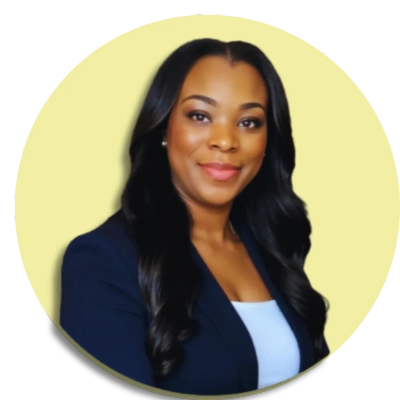
Handwritten Notes Recognize Everyday Kind Actions
The team began writing handwritten thank-you notes to their colleagues from the start. The team members receive appreciation notes for their consistent behavior and their patient and kind actions which do not typically receive recognition. The simple gesture of receiving a handwritten note from our front desk lead made me understand its deep impact.
The team follows an unwritten policy which allows employees to take a break whenever they need to unwind during difficult days. This benefit serves as a reminder that showing empathy stands above all else in our organization. People who experience support and visibility from their colleagues will naturally adopt kindness as their standard behavior instead of treating it as an occasional occurrence.

Role Model Recognition Program Honors Ethical Standards
We’ve built a culture of respect through our “Role Model Recognition” program. Every year, we award team members who demonstrate exceptional ethical standards and customer service, not just sales results.
We reinforce this through structured mentorship where senior principals work directly with newer agents, sharing not just sales techniques but our philosophy of putting client needs first.
Most importantly, we practice what we preach in leadership. When principals, like myself, model respectful communication and collaborative problem-solving, it cascades throughout the organization.
The proof is in our results; we maintain one of Canberra’s highest employee retention rates. People stay because they feel valued and supported, not just financially rewarded.

Open Creative Lines Welcome All Ideas
We have created an environment where everyone gets input. We are building something new, so we need everyone’s thoughts and ideas. Nothing is too small or too big. You never know where each thought will lead you, even if it’s silly! It doesn’t matter if it challenges what we have already thought. We always keep creative lines open.
We reinforce this by keeping the conversation going. We talk about how each idea leads to another.


